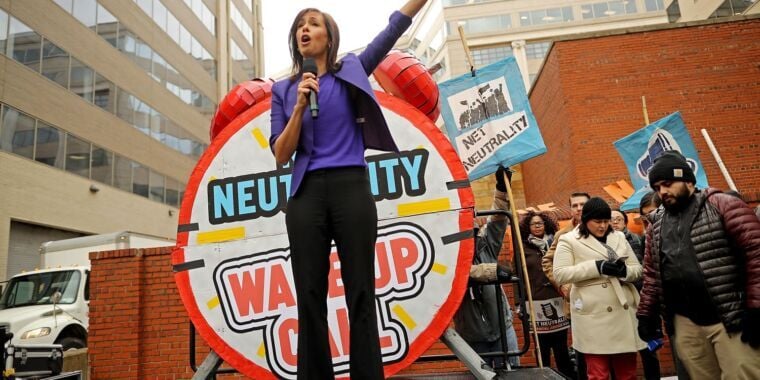- cross-posted to:
- [email protected]
- cross-posted to:
- [email protected]
The Federal Communications Commission voted 3–2 to impose net neutrality rules today, restoring the common-carrier regulatory framework enforced during the Obama era and then abandoned while Trump was president.
The rules prohibit Internet service providers from blocking and throttling lawful content and ban paid prioritization.
“Consumers have made clear to us they do not want their broadband provider cutting sweetheart deals, with fast lanes for some services and slow lanes for others,” FCC Chairwoman Jessica Rosenworcel said at today’s meeting.



No reason they should exist in any day and age.
Companies do not pay per packet. Paying more for more bandwidth or lower latency kind of makes sense because theoretically they may be prioritizing your traffic when the network is under too much load. But sending 16 petabytes costs exactly the same as 1kb in a month, assuming your connection is fast enough to handle 16 petabytes in a month.
True companies do not pay per packet but they do pay for the bandwidth. The more users that use more bandwidth consistently means the ISP needs to invest more money on throughput/links. If you have 100 users and they use 1 mbps on average you can get away with a 100mpbs link. If you have 5 users using 50mpbs on average now you need a gig link. So technically it’s not free but yeah bandwidth caps suck big time. My suggestion would be to pick a place to live near a city with a municipal broadband option.
The problem ISPs ask to pay BOTH for bandwidth and for packets. Which is double payment.
Kind of. They’re asking you to pay for maximum possible bandwidth but make no claims about how long you can use that max bandwidth. Packets are only a convenient way to measure a percentage of max bandwidth use over time.
The way this works in the server world is “95th percentile” billing. They track your bandwidth usage over the course of the month (probably in 5 minute intervals), strike off the 5% highest peaks, and your bill for the month is based on the highest usage remaining.
That’s considerably more honest than charging you based solely on the highest usage you could theoretically use at any time point in a 24 hour period (which is how ISPs define the “max bandwidth”) and then charging you again or cutting off your service if you use more than a certain amount they won’t even put in writing.
“You maybe will be able to use advertised bandwidth. As long as we want. Or maybe not.”
We were supposed to build one here, but AT&T basically owns our city government lol.
They announced the project wouldn’t be moving forward because they wouldn’t/couldn’t use imminent domain to lay fiber in peoples yards. They’ve used it to build 3 stadiums in the past 20 years, and knock down entire neighborhoods in the process. Literally bulldozed multiple square miles of city.
I fucking hate it here. We gave the stadium owners a bunch of money this week to renovate their stadium for some reason.
Removed by mod
Upgrade infrastructure?! No, no. That money needs to go to shareholders. There’s no way millions of people need decent internet speeds more than shareholders need their 12th yacht.
Removed by mod
Right but if everyone sends 16 petabtyes a month the internet would collapse. Data caps do absolutely work to reduce bandwidth on a network scale. Bandwidth is measured in mbps. Limit the Mb and you reduce the necessary bandwidth.
Removed by mod
More than 6 gigabytes per second
Removed by mod
For context 16 petabytes per month is about(slightly more than) 6 gigabytes per second. Also internet was designed during times when computers were super expensive and 100% utilization was norm.
You already buy “up to” a certain speed. When the network is congested, you just deal with it.
Trying to make people budget their internet usage is stupid and pointless.